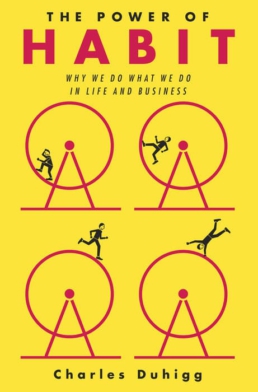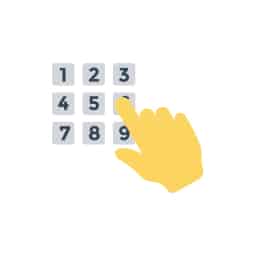The Power of Habit: Transformation in Life and Business
Table of Contents
- The Nature of Habit Formation and Transformation
- Who Needs this Book?
- The Mind Behind the Research
- Understanding Habit Formation Provides the Power to Change
- A Manual for Building Better Habits
- Key Passages in The Power of Habit
- Creating Habits that Flow Like Water
- Small Business Resources for Business & Personal Growth
How does 'The Power of Habit' by Charles Duhigg unlock the science of habit formation?
‘The Power of Habit’ by Charles Duhigg delves into the fascinating science of habit formation and change. It unveils the powerful role habits play in our lives and how they are created through a ‘habit loop’ of cue, routine, and reward. The book offers insights from neurological studies and real-life examples, demonstrating how understanding and reshaping our habits can lead to transformative personal and organizational changes. Duhigg’s work is a compelling blend of science and storytelling, providing readers with practical strategies to harness the power of habits for positive life changes.
The concept that habits hold incredible power in our lives is age-old wisdom – centuries ago Aristotle asserted that excellence is a habit, not an act, and the Greek poet Ovid claimed there is nothing more powerful than habit. Recent advancement in the science of habit formation and change has brought new insight to this timeless understanding.
In The Power of Habit: Why We Do What We Do in Life and Business, Charles Duhigg delves into the science of habit formation through powerful narratives ranging from pivotal moments of the civil-rights movement to innovative strategies in marketing and business. The Power of Habit provides a fascinating and accessible look at how habits form, how they can be changed, and their profound impact on individuals, organizations, and societies.

LinkedPhone serves the small business community with local & toll-free business numbers that work with your cell phone, desk phone, & laptop. Add a 2nd phone number to your cell phone with our mobile app. Talk & text with clients on the go. Add team members too. Finally break free from the desk phone. At LinkedPhone, freedom rings! 🔔📱💻☎️
The Nature of Habit Formation and Transformation
The Power of Habit examines the ways habits influence and govern our personal lives, impact organizational behaviors, and shape societal norms. Duhigg demonstrates how an understanding of the mechanics behind habits can lead to significant and transformative changes. From personal behaviors to business operations and broader societal trends, the book illuminates the profound effect that habits can have, offering insights into how they can be reshaped to foster success that has the potential to ripple throughout our lives.
Who Needs this Book?
The Power of Habit appeals to a broad spectrum of readers, from individuals seeking personal growth to businesses aspiring to foster organizational change. The book is a highly accessible exploration for anyone looking to understand and harness their own power over the formation and transformation of habits.
The Power of Habit is particularly useful for entrepreneurs, small business owners, and freelancers, offering practical insights on how to harness the power of habits to boost productivity and create a successful work environment. By understanding the principles outlined in the book, business professionals can cultivate beneficial habits and change harmful habits within their teams and organizations, leading to improved efficiency and business growth.
The Power of Habit is also a great resource for managers and corporate leaders. It provides them with a thorough understanding of organizational habits and strategies to implement organizational changes through habit transformation. This knowledge can be helpful for leading cohesive teams and fostering a positive workplace culture.
For further reading on how to form better habits, skillsets, and time management practices, take a look at our articles covering Skills to Succeed as an Entrepreneur or Time Management Tips to help grow your small business.
Also see the previous entry in our book review series on The Miracle Morning by Hal Elrod, who teaches how to transform your life and habits through simple routines for starting your day.
The Mind Behind the Research
Charles Duhigg brings a wealth of research and investigative skill to The Power of Habit. He is a Pulitzer Prize-winning business and investigative reporter and author of Smarter Faster Better, a book about the science of productivity. Duhigg’s background in business journalism, combined with a deep interest in the psychology of habits, makes him an insightful voice in this field. Duhigg excels at synthesizing massive amounts of information into fascinating narratives that highlight the power of habits in various aspects of life.
Business Growth Toolkit
Get the latest thought leadership insights on growing your business plus occasional LinkedPhone updates. We respect your inbox!
Understanding Habit Formation Provides the Power to Change
Each chapter of The Power of Habit presents an in-depth exploration into the workings of habits, revealing that if we understand how our habits are formed and maintained, we possess the power to change them. The Power of Habit concerns itself with habits as they are technically defined: actions that begin as deliberate choices but eventually transform into automatic behaviors. The book explains how habits are a natural consequence of our neurology and our brain’s inherent tendency to conserve effort.

The Habit Loop: Cue, Routine, Reward
At the core of Duhigg’s analysis of habit formation is the concept of the “habit loop.” The habit loop is a neurological loop that governs our habit formation. This fundamental framework consists of three elements:
-
- Cue: an initial trigger that signals the brain to enter automatic mode, setting the stage for the behavior or habit to begin, and directing which habit is to be activated.
- Routine: habits themselves, which can manifest as physical, mental, or emotional behaviors.
- Reward: benefits or outcomes that the brain derives from the habit.
Duhigg explains how over time, as the loop becomes increasingly automatic, the cue and reward become so intertwined that a powerful sense of anticipation and craving emerges. This can happen easily and subconsciously, as the brain wants to make almost any routine into a habit. The craving is what drives the habit loop.

The Golden Rule of Habit Change
Interestingly, the brain doesn’t discard habits as easily as it creates them. Duhigg asserts that they never really disappear and are always lurking, waiting for a cue to activate them. This is the golden rule of habit change: that you can never completely extinguish a bad habit. While bad habits may not be completely eradicated, they can be changed, and Duhigg guides the reader through the process of ‘tinkering with the gears’ of the habit loop. This involves identifying the cue and reward, cultivating a craving, and replacing the old habit with a new behavior that offers the same reward.

Keystone Habits and Their Impact
Focusing on the habits of successful organizations, Duhigg discusses “keystone habits” – habits that have the power to start a chain reaction or domino effect that changes other habits, potentially transforming everything in one’s life. Identifying and altering these keystone habits can significantly impact personal behavior and organizational culture.
Keystone habits are integral in fostering large-scale transformation because of their far-reaching effects. Identifying and leveraging these keystone habits can be particularly impactful for business leaders and entrepreneurs. By focusing on these crucial habits, business leaders can concentrate their efforts on changes that yield the most significant impact and effectively drive change within their organizations.
Whether it’s fostering a culture of continuous learning, prioritizing customer feedback, or implementing efficient time management strategies, the ripple effect of these keystone habits can lead to profound organizational transformation.

Willpower and Autonomy
Duhigg goes on to discuss the critical role of willpower in the process of habit transformation, framing it not just as an innate trait but as a skill that can be developed and fortified over time. He underscores that willpower is essential for initiating and maintaining the changes necessary to alter habits, whether at an individual or organizational level.
The author then presents the idea that willpower can be strengthened through practice, much like a muscle. This perspective shifts the narrative from viewing willpower as a limited resource to seeing it as a growing capacity that can be expanded with consistent effort and training. He provides insights into various strategies and techniques that individuals and organizations can adopt to build and sustain willpower.
Duhigg emphasizes the significant role of autonomy in sustaining willpower. Autonomy is a powerful motivator in habit formation and change. When individuals feel they have autonomy, they are more likely to engage in tasks, take initiative, and persist in the face of challenges, all of which are crucial for developing and maintaining new habits.
In the context of business and organizational behavior, this interplay between willpower and autonomy is particularly relevant. For example, Duhigg explains how Starbucks succeeded in transforming the habits of its employees by teaching them methods for how to deal with difficult customers and giving them autonomy in the workplace. He suggests that businesses can harness these concepts to foster a workplace culture of self-discipline and continuous improvement.
Speaking of building and maintaining positive willpower and autonomy, along with discipline, tolerance, fortitude, and other skills which serve as well for business as in your personal life, check out our review of The Obstacle is the Way, Ryan Holiday’s approachable and well-reasoned breakdown of ancient stoic virtues.

The Essential Nature of Belief in Change
Focusing on the habits of societies, Duhigg emphasizes the essential role of belief in the process of changing habits. He argues that for any significant habit transformation to occur – whether at a personal level or within an organization – there must be a fundamental belief in the possibility of change. This belief is a crucial component that fuels the entire process of habit alteration.
If you need a little motivation to help you kickstart defining your own values and beliefs, check out our list of inspirational quotes for entrepreneurs.
In a business context, the power of belief takes on an even broader significance. Duhigg points out that for organizations aiming to undergo transformation, creating a culture that wholeheartedly believes in the potential for change is essential. This collective belief helps to overcome resistance, fosters a sense of unity, and drives the motivation needed to alter entrenched organizational habits. When leaders cultivate a belief in change, they lay the groundwork for a more adaptable and resilient organization.
For more on defining organizational goals and fostering positive habits, check out our article on defining your business value proposition.
Social Habits and Peer Pressure in Change Initiatives
Duhigg extends his exploration of habit formation and change to the realm of social habits and the influence of peer pressure. He emphasizes that these social dynamics play a crucial role in the success of any change initiative or movement, whether in personal lives, within organizations, or across broader societal landscapes. Duhigg points out that social habits often set the norms and expectations within a group, subtly guiding individual actions and decisions. When these group norms are focused towards positive behaviors, they can significantly increase the success of change efforts.
We know the importance of employee appreciation for workplace productivity (see our Complete Guide to Employee Appreciation for some great ideas), but Duhigg illustrates how the influence of peers can motivate individuals to adopt new habits or abandon old ones. Peer pressure can create a sense of accountability and support, which is vital in maintaining motivation and commitment to change. In a group setting, when individuals observe their peers engaging in desired behaviors, they are more likely to emulate these actions, leading to a collective shift in habits.
Enjoying this in-depth book review?
Check out the full list of business books we’ve rated and summarized for you here: 44 Best Business Books for Entrepreneurs, Startups & Small Business
Also, see our curated lists of business podcasts and online forums for entrepreneurs for more great small business information and community resources.
A Manual for Building Better Habits
The book concludes with an appendix that serves as a practical manual for habit change, guiding readers through a step-by-step process of identifying routines, experimenting with rewards, isolating cues, and developing a plan. This section of the book provides a guide for anyone wanting a formula to utilize the practical advice in The Power of Habit.
Key Passages in The Power of Habit
-
- “Habits, scientists say, emerge because the brain is constantly looking for ways to save effort. Left to its own devices, the brain will try to make almost any routine into a habit, because habits allow our minds to ramp down more often.”
- “Every habit, no matter its complexity, is malleable.”
- “To modify a habit, you must decide to change it.”
- “Once you break a habit into its components, you can fiddle with the gears.”
- “Habits never really disappear. They’re encoded into the structures of our brain…the problem is that your brain can't tell the difference between bad and good habits, and so if you have a bad one, it’s always lurking there, waiting for the right cues and rewards.”
- “Willpower is a learnable skill, something that can be taught the same way kids learn to do math and say ‘thank you.’”
- “Once you know a habit exists, you have the responsibility to change it.”
- “Cravings are what drive habits. And figuring out how to spark a craving makes creating a new habit easier.”
- “This is how new habits are created: by putting together a cue, a routine, and a reward, and then cultivating a craving that drives the loop.”
- “The Golden Rule of Habit Change: You can’t extinguish a bad habit, you can only change it.”
Creating Habits that Flow Like Water
The book’s final analogy, comparing habits to the flow of water, encapsulates the essence of its message. Just as water carves its path with persistence and subtle force, so do our habits sculpt the landscape of our lives. Duhigg’s masterful use of this metaphor not only underscores the power and pervasiveness of habits but also instills hope – the hope that, with understanding and effort, we can redirect these currents, reshaping our habits to forge new, more beneficial paths.
The Power of Habit is an enlightening journey into the psychology of habits. Its combination of anecdotal evidence and scientific research makes it a valuable read for anyone looking to understand and modify their habits. The book is particularly recommended for business professionals and entrepreneurs, providing actionable insights into leveraging habits for personal productivity and organizational success.
You can find out more about the book and read other reviews or purchase your own copy on Amazon, or listen to the audiobook on Audible.
Did you enjoy this book review? Make sure to check out the full list of 44 Best Business Books for Entrepreneurs, Startups & Small Business.
And don’t forget to browse our collections of business podcasts and online forums for entrepreneurs for more small business resources.
LinkedPhone provides essential communication tools for entrepreneurs and small business owners to help manage busy operations. Find out more about the many professional calling features provided by our virtual phone system, or sign up for a 7-day free trial of LinkedPhone with a free business phone number today!
Small Business Resources
A special high five to Faith Dickens for her outstanding research and contributions to this article. We love working with and supporting like-minded entrepreneurs. Thank you Faith! ❤️
Get In Touch
We would love to hear from you.
Please contact us at any time with questions or feedback.



























